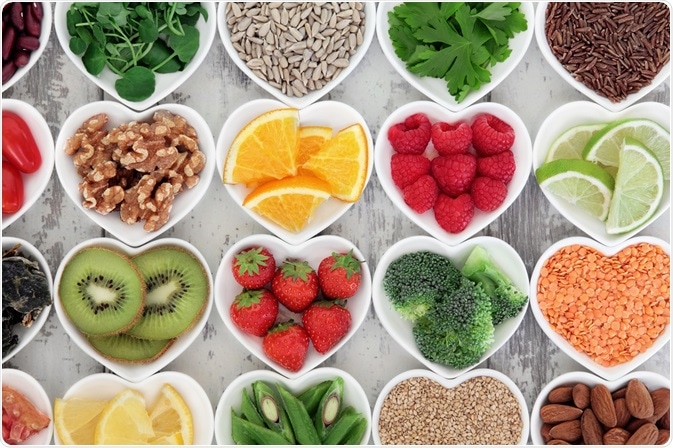It is important for a diabetic to control their blood sugar levels, and one of the easiest ways of doing this is through dietary changes.
 Image Credit: marilyn barbone / Shutterstock
Image Credit: marilyn barbone / Shutterstock
Management of diabetes, primarily through insulin injections or lifestyle changes is vital. These approaches aim to re-establish control of glucose levels, reducing the risk of serious consequences. One possible way to achieve this is by consuming less sugar, which aids both weight loss and successful blood glucose metabolism.
What are sugars?
Many types of sugars are found in food naturally, such as fruits, vegetables and milk. These sugars are very important in a normal diet, aiding many important biological processes.
It is the “free” sugars present within food products that must be cut down to tackle diabetes, often added into products by manufacturers under a different name. Food labels often use the following words to indicate the presence of added sugars: glucose, sucrose, maltose, molasses, honey, treacle and syrups.
There are numerous guidelines in place to ensure that individuals do not ingest too much of these sugars. Overall, they stipulate that they should not exceed 5% of daily energy intake.
Which foods contain lots of additional sugars?
The main “free sugar” diet contributors are within foods such as sweets, chocolate and fizzy drinks. For example, cola has 9 cubes of sugar within a single 330ml can. Therefore, one possible way of minimising sugar consumption would be to swap to diet cola, which contains no sugar. However, these sugars are also found in ready meals, various sauces, alcohol and in many other unexpected items.
Guidelines for reducing sugar intake
There are various ways of cutting down on sugar intake, for example, by applying reduced-sugar jam to toast, rather than excessively sugary options such as marmalades, chocolate spreads and honeys. Choosing wholegrain cereals, that contain far less sugar, in place of alternatives which contain frosting or honey, can also be beneficial.
Other ways to reduce the amount of sugar in your diet include having semi-skimmed milk rather than full fat milk, and fruit rather than fruit juices. In breakfast alone, sugar intake can be dramatically reduced.
One of the main ways that sugar is consumed is through snacking, however, this can be combatted by introducing alternative snacking options, such as celery, cucumber, carrots and other vegetables. Nuts are also a good choice, but they are high in calories so cannot be consumed in high quantities. Tzatziki, hummus, and other dips are also good alternatives to common snacks.
Other general ways of cutting down “free sugar” intake include:
- Reducing alcohol intake
- Increasing vegetable and fruit intake (at least five per day)
- Avoiding over processed meat
- Avoiding high sugar snacks, such as chocolate and sweets, and swapping them for nuts and vegetables
- Eating beans and eggs (key sources of protein)
- Increasing fibre intake
- Check nutrition labels - ensuring that products are low in added sugars
Examples of low sugar foods
More examples of healthy food options include naturally low sugar foods, such as:
- Vegetables: carrots, onions, mushrooms, asparagus, celery, broccoli
- Grains: brown rice, crackers, quinoa, oats
Moreover, some foods are completely sugar free. These include:
- Proteins: seafood, pork, beef, chicken, lentils, beans, soybeans
- Fats: butter, nuts, seeds
There are also some foods which contain sugar, but at low quantities can be beneficial, including:
- Dairy: Greek yoghurt, low fat cheese
- Fruit: olives, melon, rhubarb, raspberries
By cutting down on the amount of added sugars which are consumed, diabetic symptoms can be managed and reduced. Alongside medications, such as insulin injections, this can be enough to successfully reduce the risk of serious life-threatening complications, such as neuropathy, eye problems and heart failure.
Further Reading
Last Updated: Feb 26, 2019